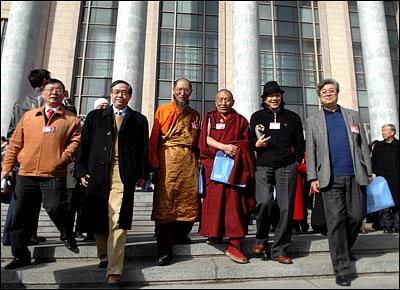China is a country of many ethnic groups and many political
parties. Before the state adopts important measures or makes
decisions on major issues with a bearing on the national economy
and the people's livelihood, the Communist Party of China (CPC), as
the party in power, consults with representatives of all ethnic
groups, political parties and democrats without party affiliation,
and all other social sectors. This system of multi-party
cooperation and political consultation led by the CPC is a basic
political system in China.
 |
Multi-party cooperation and political consultation take two
principal forms: (1) The Chinese People's Political Consultative
Conference (CPPCC); (2) consultative conferences and forums
participated in by people from democratic parties and democrats
without party affiliation at the invitation of the CPC Central
Committee and local Party committees. The CPPCC is neither a state
organ nor an ordinary civic organization. It is a widely
representative, patriotic united front organization of the Chinese
people. It has a National Committee and provincial (autonomous
regional and municipal) and county (city) level local committees.
The CPPCC National Committee consists of representatives of the
CPC, democratic parties, democrats without party affiliation,
people's organizations, ethnic minorities and other social strata,
compatriots from Taiwan, Hong Kong and Macao, returned overseas
Chinese, and specially invited individuals. The CPPCC is elected
for a term of five years, its current Chairman being Jia Qinglin.
In addition to attending a plenary session of the CPPCC once a
year, CPPCC National Committee members are invited to attend the
NPC and fully air their views as non-voting delegates, so as to
exercise the functions of political consultation, democratic
supervision and participation in the deliberation and
administration of state affairs. When the committee is not in
session, special activities for the committee members are
organized, including inspection tours of various localities.
Consultative discussions are held on significant issues relating to
major state policies, the people's livelihood and united front
work. Democratic supervision is exercised over the work of state
organs and the fulfillment of the Constitution and laws through the
offering of opinions, proposals and criticisms. Once a year,
leaders of the CPC Central Committee invite leaders of the
democratic parties and representatives of democrats without party
affiliation to consultation meetings; forums are held every other
month. The former focuses on major state policies, the latter on
exchange of information, receiving policy proposals and discussing
special issues.??